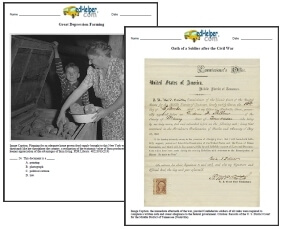
Worksheets and No Prep Teaching Resources
Reading Comprehension Worksheets
The Civil War
(1861-1865)

The Civil War
(1861-1865)
 Worksheets and No Prep Teaching Resources Reading Comprehension Worksheets The Civil War (1861-1865) |
 The Civil War (1861-1865) |
| edHelper's suggested reading level: | grades 8 to 10 | |
| Flesch-Kincaid grade level: | 8.52 |
|
Prisoners of War
By Mary Lynn Bushong |

|
 |
Create Weekly Reading Books
Prepare for an entire week at once! |
| Leave your feedback on Prisoners of War (use this link if you found an error in the story) |
 |
The Civil War (1861-1865) |
 |
High School Reading Comprehensions and High School Reading Lessons
|
 |
United States
|
|
|
 | Fifty States Theme Unit |
 |
Document Based Activities |